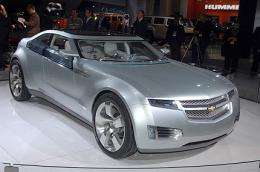May 22, 2009 weblog
Toyota Not Too Keen On Plug-In Hybrids

(PhysOrg.com) -- Toyota is recognized as one of the leaders in hybrid technology, so it may come as a surprise to some that the company is not terribly keen on selling hybrid plug-ins to consumers. Even though the company is planning to build 500 plug-in Prius cars for test fleets, there are no immediate plans to develop plug-in hybrid technology for consumers.
At first, it may seem counter-intuitive for Toyota to shun plug-in hybrids. After all, GM plans to release the Chevy Volt -- its plug-in hybrid -- next year. But it makes a little more sense after you read Toyota's reasoning, reported by AutoMonster.ca:
Toyota estimates sales of hybrids that can be recharged at household outlets may be 50,000 units a year at most and could be as few as 3,500, Bill Reinert, U.S. national manager for advanced technology, told a National Academy of Sciences panel today in Washington. Sales of Toyota's Prius, the best-selling gasoline-electric vehicle, were almost 159,000 last year.
A market for the plug-in electric hybrid vehicles "will emerge, but their success depends on advantages over existing hybrids," Reinert said in prepared remarks. "There is a great deal of variation on how current PHEVs perform in real-world conditions."
Clearly, Toyota think it already has a good think going with its current Prius -- no plug needed. Plug-ins are considered somewhat inconvenient right now by many consumers. They have to be charged regularly, and there needs to be the proper infrastructure to support plug-ins so that commuters can charge up their cars while at work.
Of course, the fact that 75% of Americans live within 20 miles of their work means that the 40-mile range of the Volt may be sufficient. Besides, the Volt also has an electric-gasoline hybrid engine that can switch to gasoline when the battery runs down. So at least there isn't the fear of being stuck. Current electric-gasoline hybrids don't have the plug-in factor. They are desirable because they don't require consumers to make any significant changes in their behavior. Although, technically, the Volt wouldn't require a change, either. But its battery is more expensive (adding to the cost of the car).
Honda is also reluctant to introduce plug-in hybrids. The company says it's studying the matter to determine whether it is worth the investment in plug-ins. The reluctance of the Japanese automakers to get involved may pave the way for American carmakers to lead the way for plug-ins. But with Honda and Toyota offering a product consumers are already comfortable with (and may prefer), does it even matter?
© 2009 PhysOrg.com



















